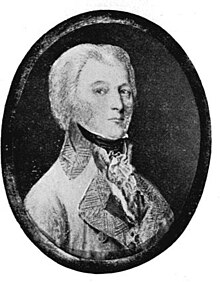Pál Kray
| Paul Kray | |
|---|---|

Baron Paul Kray
|
|
| Born |
5 February 1735 Käsmark (Késmárk), Hungary |
| Died |
19 January 1804 (aged 68) Pest, Hungary |
| Allegiance |
|
| Service/branch | Colonel and Proprietor, |
| Rank | Field Marshal |
| Battles/wars |
War of the Bavarian Succession (1778) |
War of the Bavarian Succession (1778)
Habsburg War with the Ottoman Empire (1787–1791)
War of the First Coalition (1792–1797)
Baron Paul Kray of Krajova and Topolya (German: Paul Freiherr Kray von Krajova und Topola; Hungarian: Krajovai és Topolyai báró Kray Pál; 5 February 1735 - 19 January 1804), was a soldier, and general in Habsburg service during the Seven Years' War, the War of Bavarian Succession, the Austro–Turkish War (1787–1791), and the French Revolutionary Wars. He was born in Késmárk, Upper Hungary (today: Kežmarok, Slovakia).
He withdrew from military service temporarily in 1792 because of poor health, but in 1793, he was recalled to the Habsburg military in the Netherlands at the request of Field Marshal Prince Coburg and fought in the Flanders Campaign.
In 1799 he was appointed commander of the Austrian forces in Italy and Colonel-Proprietor of the Infantry Regiment N.34, a ceremonial position he held until his death. On 18 April 1799, Kray was promoted to Feldzeugmeister. In the 1800 campaign, Kray commanded the Austrian force on the Upper Rhine, charged with the defense of all approaches to Vienna through the German states. After being out-maneuvered by the French, he was disastrously defeated in five consecutive battles. After the Battle of Neuburg, the French acquired both shores of the river, and commanded access to the Danube waterway as far east as Regensburg. During the subsequent armistice, Emperor Francis II replaced Kray with his brother, Archduke John; Kray was discharged on 28 August 1800 and retired to Pest, Hungary. He died there on 19 January 1804. For all his victories, for his fierce competitiveness on the battlefield, the French soldiers referred to him as Le terrible Kray, le fils cher de la victoire and men from both sides attended his funeral in 1804.
...
Wikipedia
